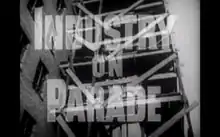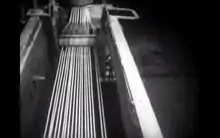Industry on Parade
Industry on Parade was a short television program that aired in the United States from 1950–1960. It was produced by the National Association of Manufacturers (NAM). The show depicts complicated industrial processes that transform raw materials into finished products available for consumption by Americans. Its episodes generally contain several sections, each of which looks at a different aspect of some larger topic within industry.[1]
| Industry on Parade | |
|---|---|
 | |
| Created by | National Association of Manufacturers, |
| Country of origin | United States |
| Original language | English |
| No. of seasons | 10 |
| Production | |
| Producers | National Broadcasting Company, Arthur Lodge Productions |
| Running time | 13.5m |

The show was nationally syndicated, and local stations could show it free of charge—which they did, in a wide range of different time slots. Footage was also distributed widely among American schools and community organizations.[2] Ratings information is scarce but existing local reports suggest that the show was quite popular.[3]
History
The show was reportedly conceived by Johnny Johnstone, the director of television and radio at NAM.[2]
NAM collaborated with NBC in producing the show from 1950–1953.[4] (NBC producer Arthur Lodge continued to work with the show until it ended in 1960.)[2]
The series received a Peabody Award for National Public Service in 1954.[5][6]
In 1958, the show changed formats, recycling and rearranging old footage to provide broader overviews of different industries.[2]
In total, Industry on Parade aired more than 500 episodes during its 10 years in existence. These reels were donated to the National Museum of American History in 1974, and held by the Division of Agriculture and Natural Resources until being transferred to the Archives Center in 1994.[2]
Themes
The show promotes capitalist industrial production and typically ends with an anticommunist message. The success of Industry on Parade provoked the AFL–CIO to demand its own "public service" time on television, which they obtained and used to broadcast Americans at Work (1958–1961).[7]
The show generally depicts and promotes women in the workforce.[2]
References
- Samuel Dodd, "'Industry on Parade': Developments in Invention and Research", The Atlantic, 4 August 2012.
- Jason S. Mittell, "Invisible Footage: Industry on Parade and television historiography", Film History vol. 9, 1997, accessed via JStor.
- Elizabeth A. Fones-Wolf, Selling Free Enterprise: The Business Assault on Labor and Liberalism, 1945-60, Champaign: University of Illinois Press, 1995, p. 52, ISBN 9780252064395.
- Susan B. Strange and Wendy Shay, "Industry on Parade Film Collection, 1950–1960: #507 Archived 2012-10-20 at the Wayback Machine", National Museum of American History: Archives Center, 10 September 2001.
- "Radio: Kudos". Time. April 18, 1955. Retrieved February 27, 2021.
- "The Peabody Awards - Industry on Parade". Retrieved February 27, 2021.
- Anna McCarthy, The Citizen Machine: Governing by Television in 1950s America, New York: The New Press, 2010, p. 208. ISBN 978-1-59558-498-4.